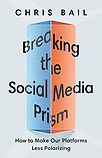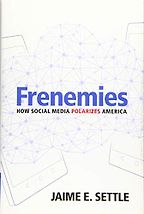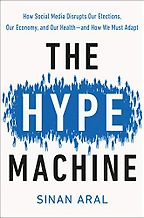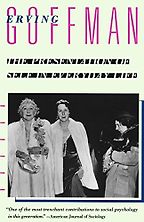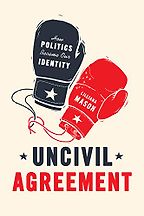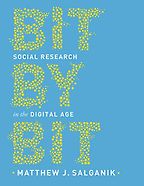In the acknowledgments section of your book, Breaking the Social Media Prism, you write that, for you, “political polarization is personal” and you mention your childhood experience of being in the French Congo as it descended into civil war. Now you study polarization on social media platforms. Are those different points on a spectrum—are you worried they’re linked?
My childhood experience certainly left me with a life-long fascination about political conflict—and especially how people who are so similar to each other can become so violent towards one another. How technology plays into such conflict is an obvious concern for anyone who came of age during the rise of the internet and social media like me, I think. Is the US at risk of the same type of violence I witnessed in the French Congo long ago? I think this is very unlikely, but it is extremely concerning that large numbers of Republicans and Democrats have endorsed violence for political ends in recent surveys.
Your book is really interesting because you use the findings from your work as a social scientist to challenge some common myths about polarization and social media’s role in it. Can you take us through some of the things we need to be aware of so we can keep them front and centre?
Thanks for your kind words. I think the most important thing that people need to understand about social media is that it’s not simply a place that we go to search for information or to entertain ourselves. Increasingly, it’s a way that we understand ourselves and each other. It’s a tool we use to create our identities and gain social status. We think of social media users as more or less rational creatures who go online, encounter new types of information and then decide whether they think it’s reasonable or not. But really all of the research I’ve done for the last decade or so has convinced me that it’s actually helping us do something that is all too human—present different versions of ourselves, look at how other people react, and then cultivate the kind of identities that make us feel good about ourselves. So it’s really more an engine for the creation of our identities than the public square of democracy that so many people want it to be.
One of the things you point out in the book is that the ‘echo chamber’ we hear so much about is not necessarily the problem. Say in my case: I just tested myself on your polarization meter and I’m 2.56 liberal—I mean, in a European context I think of myself more as a centrist, but that makes me a liberal in US terms—but if I heard lots of very conservative viewpoints in my social media streams that actually might make me more stridently liberal rather than pulling me towards the centre.
We need to think about what we’re exposing ourselves to when we step outside of our echo chamber. Again, we’re not stepping outside to calmly consider alternative viewpoints. Many times, instead, stepping outside our echo chamber can be experienced as an attack on one’s identity. If you look at the type of discourse that goes on today on social media, it disproportionately involves extremists attacking the identities of people on the other side. So if we experience stepping outside our echo chamber as an attack upon our identity, our research indicates that it will cause people to double down on their pre-existing views and only learn how to defend their identities better.
At the same time, many people avoid expressing centrist views on social media for fear of being attacked by their own side, for not being liberal or conservative enough.
I think everybody has an extreme uncle or an extreme aunt who they worry about when they discuss politics. For many people, the fear of the centre comes not only from the other side, but from extreme members of their own political tribe, that’s exactly right.
It’s a really, really important book and really educational. Everybody is using social media—even those who don’t want to, who have to use it for work. As a result, we’re exposed to these things. And when you get horrible abuse or weird opinions you do wonder where it’s coming from, or sometimes you wonder why you’re being aggressive yourself. And I’m a bit confused about political polarization in general. Say with Brexit. I mean, we knew there were some people in the UK on the right who’ve always been a bit irritated by Europe and didn’t want to be part of it—but that it could be an issue that would split the country in half and make people so angry, that was totally unexpected.
One of the things I liked about writing this book was the opportunity to follow people online. I discovered that the people that we meet online are often caricatures of much more complex, nuanced, people offline. This really helped give me the optimism that there are people who are reasonable and ready to compromise out there. They’re just not the majority of people talking about politics on social media.
Let’s look at the books you’re recommending to get a better understanding of social media and political polarization. So the first one you’ve chosen is Frenemies: How Social Media Polarizes America by a political scientist, Jaime Settle. Tell me why that’s important to read to understand what’s going on.
Frenemies is just such a great contribution. It was one of the first books to really study social media and polarization in a very careful, empirical manner. This book is for readers who really want to go deep into the research design, really understand how social scientists can, for example, conduct experiments that simulate Facebook or understand how social networks shape political polarization. Jaime Settle is a really talented scholar. The rigor of the experiments and design are just wonderful in this book.
And what does she discover, what’s the overall conclusion of the book?
I think one of the nice conclusions was to demonstrate this phenomenon of false polarization. This is the tendency for all of us to exaggerate the extremity of the other side and underestimate the extremity of our own side. It has been known since the 1990s that people do this, at least in the US. And, actually, there’s some evidence of it internationally now as well. But hers was really the first book, I think, to make such a strong connection to social media, particularly.
She’s focused primarily on Facebook, is that right?
The book was written during the surging period of Facebook’s popularity, so there weren’t many other dominant paradigms. Twitter was still relatively small. And, of course, TikTok and Instagram weren’t really around. So I think it’s fair to say it’s primarily about Facebook.
So, at the time, there weren’t many social scientists using the data to look at these issues. More generally, are we in an area where lots of generalizations are made about polarization based on individual tweets and opinions, and not that much science, looking at what’s actually going on?
Yes. I think a lot of the problem is that the people shaping the debate are not social scientists. They’re not people who have done studies of this issue. So, we have a lot of former tech employees. In the book I call them ‘apocryphal tech leaders’, people who played a central role in creating platforms, and now regret their actions. To some degree, it’s like the tobacco merchants wanting to run the oncology clinic—this idea that the people who created the problem are now uniquely qualified to fix the problem. You have people that have an engineering background, they’re extremely bright, they’ve built new technology that that no one had seen before, it’s just phenomenal. But that doesn’t mean that they have a keen understanding of human nature. Somewhat uncritically, they tend to adopt untested and highly speculative ideas about human behavior that have really been outmoded by the social science. So we see a lot of that from tech leaders on the one hand.
“The internet allows us to be completely different people”
On the other hand, a lot of politicians, who are also very often self-interested, want to make an easy scapegoat out of social media. For example, its role in the election of President Trump and the conservative bias in social media in the US, or, for those on the right, there’s a lot of concern about social media companies clamping down on conservatives. We have these highly seductive stories: ‘it’s just foreign misinformation campaigns,’ or ‘these companies are profiting by radicalizing us with these algorithms that they don’t fully understand,’ or ‘echo chambers are dividing us and if only the companies would break us out of our echo chambers, we’d be more moderate.’ And yet, when we start to actually do these surveys—and in the last three, four, five years, we social scientists have really started to do them—we’re seeing that for most of these common narratives are there, there just isn’t much evidence. We need a new explanation.
Let’s move on to the next book, which is The Hype Machine by Sinan Aral. Tell me about this book. What is The Hype Machine?
The Hype Machine is just a wonderful overview of the social science research on social media. Sinan Aral is a really accomplished computational social scientist, someone who uses the tools of data science to study human behavior. He’s run some of the first and largest studies of things like fake news, or the effect of advertising on shaping human behavior. His work really isn’t about polarization, but about social media more broadly. So he’s interested in how social media shapes business and elections and health in particular.
What I like about The Hype Machine is that nearly every claim in the book is supported by some type of evidence. So he’s entering this field of highly speculative debate and saying, ‘Well, here’s what we actually know. We’ve done a study and we know that when we put people on this type of social network, this happens, and when put them on that type of social network that happens.’ So he’s able to do some debunking. For example, the idea that microtargeting, firms like Cambridge Analytica, successfully paved the way for Brexit or the election of Trump. He shows that not only is there not much evidence for those claims, but there’s not much evidence that microtargeting works very well in general. So there are a lot of things in there that I think will surprise readers.
He’s very concerned though, isn’t he? He’s worried about what’s going on, even if some of these things aren’t as bad as we think.
He’s still worried that, fundamentally, there is going to be an inevitable conflict between the profit-seeking of large corporations and the interest of democracy. To what extent will these things inevitably collide? I think he would say that we need some kind of government regulation, to help find the sweet spot between letting free markets fix the problem and really recognizing that this is a unique challenge that we’ve never faced before. We’re in a communications environment that has been completely upended in the last 20 years.
He’s very worried about fake news, isn’t he?
Yes. We have slightly different views on this issue. He did a study that showed that fake news travels faster than real news and that provoked a lot of concern. One issue that I have with that study is that a lot of the fake news that they tracked was fake news that had already been identified by factchecking websites. And so not only does that miss a lot—other types of fake news that might be less prominent, for example, because a piece of fake news has to rise to a certain level of prominence before it’s tracked by one of these websites—but, also, the study doesn’t effectively differentiate between people who are unknowingly spreading the information in the fake news and people who are condemning the fake news. So my overall sense is that I’m much less concerned about fake news and misinformation than he is.
Let’s move on to the next book which is The Presentation of Self in Everyday Life by Erving Goffman. This is a classic text from 1956. How does it fit into these discussions of social media and political polarization?
This book really nicely captures this identity-generating process that I was describing before, this tendency for human beings to present different versions of themselves, observe how other people react, and then cultivate those identities that make them feel good about themselves. Goffman was really a pioneer in thinking about identity and how identities result from interactions. Often, when people think about identity, they think about something that’s given at birth: you are a British person, or you are male, or you’re female, or you’re an upper class person, or a lower class person. But Goffman, and many others after him, discovered the fluidity of our identities, that we tend to adapt according to our social environment.
The interesting question for me is, how has social media created a different environment for us to develop our identities and, also, new tools to monitor how other people think of us? In many ways, I was trying to write The Presentation of the Self in Everyday Life for the 21st century with my book, Breaking the Social Media Prism.
One of the things I found really interesting in your book was your description of one man who is absolutely toxic online. But when you spoke to him, he was a very polite. Is that part of this framing, this presentation of the self that is going on?
Exactly. We can present profoundly different versions of ourselves in different social settings and we’ve known this for a long time. I mean, all of us might act very differently around our closest friends than we do with our grandmother, for example. On the other hand, the internet allows us to be completely different people. When Goffman was writing this book, we were at least accountable to other people in a real-life setting. I couldn’t say that I’m a 50-year-old female because of the interactional settings Goffman developed his theory in. But, online, I absolutely could. I could be anything. There’s endless flexibility and options in presenting different versions of ourselves. It doesn’t need to be as extreme as changing one’s gender or one’s ascriptive characteristics, it could also be just a matter of emphasis—emphasize the positive, downplay the negative, and then I seem much happier than I am. We’re all familiar with this kind of profound disconnect. But we haven’t really studied and understood how the disconnect between online and offline behavior is shaping how we develop our sense of self.
So somebody who is extreme online gets gratification because by expressing those extreme views they get more ‘likes’? Or is it not that simple?
Exactly. The case you mentioned in the book is a man who is a single office manager who lives with his mother. He’s in his mid-40s or 50s. He’s not living a life of high status and luxury. In fact, he’s a social outcast, particular because he lives in a liberal city and he’s a conservative. What I discovered in comparing his life online and off is that social media was really providing him with a badly needed sense of belonging. Even if it was very artificial, and even if it was indeed driven by likes and new followers and those types of things, for him, these were a vital source of self-worth.
Let’s move on to the next book on our social media and political polarization reading list which is Uncivil Agreement by Lilliana Mason.
Lilliana Mason is one of the leading political scientists studying identity. This book, Uncivil Agreement, really signaled with convincing evidence that identity is the chief division between Republicans and Democrats in the US. (It’s only about the US, unfortunately. I know some of your audience is international. Apologies for picking such parochial books, in some sense!) She really took on the idea that voters are fundamentally rational and are voting on the basis of self-interest and showed that we will go to extreme lengths to protect our identities and attack the identities of others, even if those identities are pretty meaningless.
Get the weekly Five Books newsletter
She draws upon classic social psychology from the 1960s and 1970s to show that even the seemingly most meaningless identities, we can suddenly start to defend if they are threatened. Then she asked the question, ‘Well, if we have this tendency to blindly defend our identities and attack those of others, then what would a political party do, armed with the full resources of media campaigns and micro targeting, or other types of extensive campaign tools, with these same, human tendencies?’ And her answer is that identity has come to subsume all of the other things that used to predict our political position. It used to be that our education or class or gender would be predictive of what we think about an issue. Now, more and more, it’s simply our identity.
That’s really interesting, because I’ve always been confused by, say, something like climate change: why should one side reflexively have a particular view on it? It doesn’t make any sense to me.
I agree. It is tempting, when one makes identity central, to think of these things as almost intrinsic. You are born a conservative or you were born a liberal. What’s interesting is the way that issues become stitched together into a narrative. Why should we, a priori, assume that one’s attitudes about sexual orientation should be linked to one’s attitudes about the military?
And yet, when you look at the ways that these things become tied together, Lilliana Mason would argue, I think, that it’s political parties that strategically draw boundaries around issues that they know will coalesce support. The story that she tells is about how political parties change and stretch the identity of the political party to encompass larger groups of people. And then, over time, these things seem almost natural—but, really, they are the effect of political strategy.
It also made me laugh in your book—which is so focused on politics and polarization, and these things which are so emotive—that at some point you say that actually most people don’t really want to talk about politics at all.
It’s true. It’s really interesting, isn’t it?
So, they become inflamed something that they’re not actually particularly interested in.
That’s an important point, because you were asking about optimism earlier. One point of optimism that many people will have—both in the US and Britain, I think it’s fair to say—is that we don’t really care for our options. In the US, for example, if you ask people classic survey questions like, ‘How concerned would you be if your son or daughter married a member of the other party?’ When we look at those trends over the last 40 years, it’s disturbing because huge numbers of people are now saying that they’re really worried about this. But, in a clever experiment, some political scientist instead asked, ‘Would you rather have a son/daughter-in-law who talks about politics a lot, or one who is from the other party?’ And time and again, people just don’t want the in-law who talks about politics. It does suggest that a lot of our animosity towards the other side is simply driven by our distaste for politics in general, at least in the US.
Also, if you can’t talk about it in public, then there will be a tendency for it to become more stronger online, because you’re a bit repressed in normal life.
Yes, and one of the things that we’re observing is that the opportunities for offline contact between Republicans and Democrats in the US is really shrinking. A recent study showed that there’s now such residential segregation (by political party), that there are shockingly few opportunities for Republicans and Democrats to interact with each other, apart from in these online settings. And, certainly, the Covid pandemic has exacerbated that problem.
Hence your book’s emphasis on the importance of getting it right on these social media platforms. The answer is not to switch off, because social media is where political debates are going to be taking place. So, let’s make it a good experience, with lots of moderates participating. Let’s get to the last book, Bit by Bit by Matthew Salganik. This is about how to use data—is it more technical, for somebody who’s really wanting to do what you do?
Yes, but I would actually put this book first if I had to order the books in terms of importance. The reason is that this book is really ushering in a golden age of social science. When you think about it, 20 years ago, if I wanted to do a study—like I did in my book—I would need to go out and talk to lots of people about their political views. Maybe I could talk to a couple of 100 people, but that would be it. In the last 10 years what’s happened is the data revolution. We have unprecedented amounts of data and we can now study millions of people in seconds. For a social scientist, it’s like we finally found our telescope, to quote Duncan Watts, one of the great computational social scientists.
“The opportunities for offline contact between Republicans and Democrats in the US is really shrinking”
So Matt Salganik, in this really forward-thinking book, began to ask the question: how can this new data help us study new places? The examples he raises are everything from studying poverty in places where it’s difficult to do surveys, to studying authoritarianism. It’s all sorts of things that have been beyond the pale of social science. And yet, I also love how Matt is very careful to understand the limits of the field—the ethical dilemmas that can arise, the distortions that can happen when we only focus on the online digital traces and ignore what happens offline. That’s why it was such a great inspiration for my own book.
I had this feeling while reading your book that if we’re aware of what’s going on when we go on social media, then we can be more in control and work out ways that it doesn’t cause polarization. I’m slightly worried, having talked to you now, that you’re not quite as optimistic?
I am an optimist. A good friend describes me as ‘a dystopian idealist,’ which I think is probably the most apt description of my outlook. We need to become aware of the tendency of social media to distort our identities and that goes for both our understanding of other people and of ourselves. This thing I call ‘the social media prism’ amplifies status-seeking extremists and mutes moderates, leaving us all feeling more polarized than we really are. And it often leads many people to engage in behavior that may make them feel good about themselves, or give them a sense of status, but it’s ultimately very deleterious for democracy.
And so what we need to do is become more introspective when we use social media. We need a new kind of civics training. And that involves, in the first step, simply, becoming more aware of how social media distorts our understanding of ourselves and each other.
Five Books aims to keep its book recommendations and interviews up to date. If you are the interviewee and would like to update your choice of books (or even just what you say about them) please email us at [email protected]
Five Books interviews are expensive to produce. If you've enjoyed this interview, please support us by donating a small amount.

